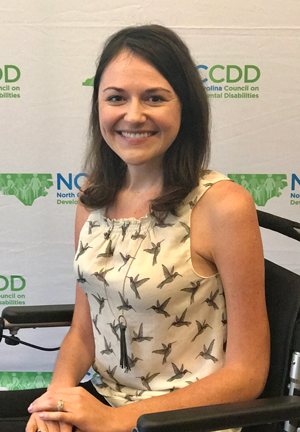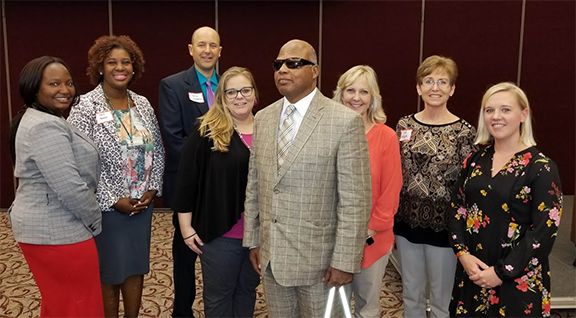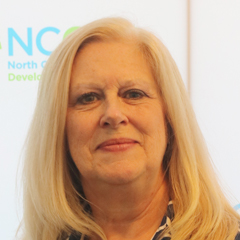August 2019 - Highlights and Hot Topics

A Message from NCCDD Chair Alex McArthur
 NCCDD Chairperson Alex McArthur
NCCDD Chairperson Alex McArthur
It’s back to school time all across America and we want to encourage you to keep learning by attending conferences and seminars on a variety of topics. We can help!
The Jean Wolff-Rossi Fund for Participant Involvement (Rossi Fund) helps individuals with intellectual or other developmental disabilities (I/DD) and their family members with specific expenses when attending seminars and conferences designed to improve their knowledge, networking and skill levels for advocacy. The fund covers a variety of expenses including portions of a conference/seminar registration, transportation, child care, personal assistance services and hotel or lodging. Learn about the specific details on what the Rossi Fund and the application process.
The newsletter also has great information on NC’s Assistive Technology Program that helps people with disabilities get access to technology to help them be successful at work, school and everyday life.
The NCCDD is always here to help. Please check out our website, share your ideas, and stay in touch.
Alex McArthur, NCCDD Chair

FEDERAL
Appropriations
In late July and early August, the House and Senate passed the Bipartisan Budget Act of 2019. The agreement increased discretionary spending for fiscal years 2020 and 2021 and lifted the debt ceiling through July 31, 2021. As the House revises its appropriations and the Senate begins its process, a continuing resolution may be needed in the interim to maintain government funding.
Voting
NC Districts 3 and 9 will hold special elections on September 10 to fill vacant seats in the US House of Representatives. Early voting will be held August 21 through September 6. Voting resources can be found at Disability Rights NC’s dedicated voting website: Access The Vote North Carolina
Money Follows the Person
After a series of short-term funding measures, the widely popular state grant program received $122.5 million of funding through 2024 with the passage of Sustaining Excellence in Medicaid Act of 2019. The bipartisan bill also funds the Family2Family Health Information Centers found in each state.
STATE
Legislature
There has been very little movement in the budget process since the last issue of Highlights & Hot Topics. The state is currently operating under last year’s budget. As a reminder, the approved legislative budget was sent to the Governor, who vetoed the budget bill because Medicaid expansion was not included. The House has a veto override on their agenda but does not appear to have enough votes to override the veto. So, we continue to wait. As described last month, the following items were included in the budget that was approved by the legislature, and we hope that these will remain through the negotiations regarding Medicaid expansion.
- Medicaid Transformation Funds: Dollars to support the transition to Medicaid managed care. Most of this is to pay for the fee-for-services claims that will continue through the transition.
- Expanding Innovations Waiver: The budget includes 500 slots to begin in January 2020 and 500 slots to begin in January 2021.
- Traumatic Brain Injury Funding: The budget includes recurring dollars in each fiscal year of the biennium for TBI services.
- Supplemental Short-Term Assistance for Group Homes: This funding fills a gap created when some people with I/DD lost funding due to eligibility changes to Personal Care Services.
- ICF Group Home Wages: The budget increases the capitation rates for LME/MCOs to enable increases in the wages paid to direct support personnel working in ICF group homes for individuals with I/DD to align with wages paid in the Developmental Centers
- Innovations Wages: Funds are included to conduct and actuarial analysis and wage and hour study of Innovations program to determine what is needed to increase wages to align with wages in Developmental Centers.
- Addressing Unmet Needs in Innovations Waiver: Budget calls for a ten-year plan to be developed by the Division of Health Benefits (DHB) with input from stakeholders to address the waiting list.
- Evidence-Based Supported Employment: Provides funds to APSE to develop training to implement supported employment.
Medicaid Transformation continues to move forward with Standard Plan expected to launch in November. DHHS is continuing to proceed with steps necessary to launch, but if there is not a resolution on the state budget, implementation will likely be delayed as there are needed funds for the transition to managed care included in the budget.
- The Medicaid Managed Care call center (833-870-5500) and website went live on June 28. Beneficiaries are already using both to learn more about managed care and enroll in a health plan.
- In July, letters were sent out to Medicaid beneficiaries in Regions 2 and 4 explaining the new way of receiving health benefits through Medicaid.
- Individuals with intellectual or other developmental disabilities (I/DD) who are in the NC Innovations Waiver will NOT receive a letter. They will remain in the current fee for service Medicaid called Medicaid Direct for medical services and continue to receive Innovation Services through the LME/MCO until 2021.
- People who have Medicaid as their health insurer and are using Medicaid b3, state funded (IPRS), or other Medicaid services (e.g. ABA through Medicaid, Research-Based Behavioral Health Treatment) and are NOT on the Innovations waiver, will get a letter indicating options to enroll in a Standard Plan or remain in the Tailored Plan. It is important to know if someone moves to the Standard Plan, they will no longer be able to receive state-funded services and supports.
- The Behavioral Health/IDD Tailored Plan is being developed with a projected launch in July 2021. The design of the program is now available for review. On August 2, the Department issued several updates to the March 2019 eligibility and enrollment policy guidance for Behavioral Health I/DD Tailored. The updates included:
- New forms for beneficiaries assigned to Standard Plans to request to stay in NC Medicaid Direct (fee for service) and the LME-MCO.
- Updated enrollment policy to transition Standard Plan enrollees who urgently need a service covered only by NC Medicaid Direct/LME-MCO. A new policy allows for urgent transfer requests.
- Additional criteria for I/DD were included. More genetic syndromes were included, and use of enhanced crisis services during 18 month look-back period was added as criteria for the Tailored Plan.
Self-Help’s Assistive Technology Financing Program
 Seeking help with the cost of assistive technology devices? Through a Department of Education Assistive Technology Alternative Financing Program grant, Self-Help Credit Union offers affordable loans to cover equipment that helps improve the quality of life for people with disabilities including but not limited to hearing aids, vehicle modifications, communication devices, and more. In its first year, this program has awarded 13 loans totaling $123,675.56 in the state of North Carolina.
Seeking help with the cost of assistive technology devices? Through a Department of Education Assistive Technology Alternative Financing Program grant, Self-Help Credit Union offers affordable loans to cover equipment that helps improve the quality of life for people with disabilities including but not limited to hearing aids, vehicle modifications, communication devices, and more. In its first year, this program has awarded 13 loans totaling $123,675.56 in the state of North Carolina.
Persons with any disability or their family members are eligible to apply for financing. State of North Carolina and Medicaid assistive technology restrictions do not apply. For more information and to apply for a loan, click here
Raleigh Mayor's Committee For Persons With Disabilities Celebrates the ADA
“Everybody in the whole world has some kind of barrier at some point in their life.”
-- Ashley Hayes Chassereau, Community Employment Program Specialist,
North Carolina Division of Vocational Rehabilitation Services (DVRS)
 Raleigh Mayor’s Committee members and presenter Ashley Hayes Chassereau (in the middle), Community Employment Program Specialist at the NC Division of Vocational Rehabilitation ServicesOn July 24, Raleigh Mayor’s Committee for Persons with Disabilities hosted its annual Employer Resource Workshop designed to educate businesses, hiring managers and human resource professionals about ways to recruit, hire and retain employees with disabilities.
Raleigh Mayor’s Committee members and presenter Ashley Hayes Chassereau (in the middle), Community Employment Program Specialist at the NC Division of Vocational Rehabilitation ServicesOn July 24, Raleigh Mayor’s Committee for Persons with Disabilities hosted its annual Employer Resource Workshop designed to educate businesses, hiring managers and human resource professionals about ways to recruit, hire and retain employees with disabilities.
The event coincides with the anniversary of the signing of the Americans with Disabilities Act (ADA), which President George H.W. Bush signed into law on July 26, 1990. Mayor’s Committee Chair Dr. Ricky Scott welcomed the audience of approximately 70 people, and then member Shakema McClean read the Americans with Disabilities Act Awareness Day proclamation from the Office of Mayor Nancy McFarlane.
Kimberly Lehman, an attorney with Ogletree Deakins, presented about the Family Medical Leave Act (FMLA) of 1993 and other laws affecting leave for employees and employer requirements. Then Ashley Hayes Chassereau, Community Employment Program Specialist with the North Carolina Division of Vocational Rehabilitation Services (DVRS), shared the services that assist employers in hiring qualified employees with disabilities. Betty Gholston, Chief of Rehabilitation Field Services at the North Carolina Division of Services for the Blind (DSB), discussed the tools and technology available to help individuals with vision loss successfully contribute to the workplace.
The event also featured the Mayor’s Committee awarding two $1,000 scholarships known as the James Benton Achievement Award to Bailey Holt and William Roberts. Both recipients are Raleigh residents with a disability who are pursuing a degree at North Carolina State University.
The Mayor’s Committee would like to thank Kristy Dixon for her role in planning this event for many years.
Council Member Profile: Meet Sherry H. Thomas
 Council Member Sherry ThomasSherry H. Thomas represents the NC Department of Public Instruction (DPI) on the North Carolina Council on Developmental Disabilities (NCCDD). As State Director, she ensures students with disabilities develop intellectually, physically, emotionally, and vocationally through the provision of an appropriate individualized education program in the least restrictive environment.
Council Member Sherry ThomasSherry H. Thomas represents the NC Department of Public Instruction (DPI) on the North Carolina Council on Developmental Disabilities (NCCDD). As State Director, she ensures students with disabilities develop intellectually, physically, emotionally, and vocationally through the provision of an appropriate individualized education program in the least restrictive environment.
Thomas has over 32 years of experience in special education. “I have advocated for students with disabilities as a classroom teacher, diagnostician, program specialist, consultant at the state level, as a section supervisor, assistant director and, now director. This is my passion as well as my vocation,” Thomas says.
Appointed by Governor Roy Cooper to the Council this past March, Thomas says, “I believe the interagency interaction is a very positive feature of the Council. It creates a natural platform for integration of work and knowledge of other areas supporting those with disabilities. Interagency collaboration is critical to providing complete, wrap-around services for those with disabilities.”
Thomas has a bachelor’s degree in Special Education from Sacred Heart College and a Master of Education in Special Education from UNC-Charlotte. She lives in Raleigh, where, during her down time, she enjoys reading, gardening, the theatre, and travel. She keeps the William James quote "Act as if what you do makes a difference. It does." in front of her as a reminder that each day, students are the object and recipients of all our work.
En Espanol - August 2019
Audio - Highlights and Hot Topics
